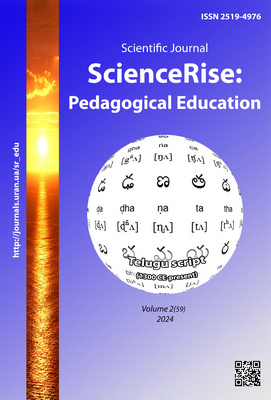Organization of professional communication in social work
DOI:
https://doi.org/10.15587/2519-4984.2024.302398Keywords:
communication, professional communication, technologies, forms, directions, possibilities, mediation, supervisionAbstract
The article analyzes the key concepts of "communication" and "professional communication" from the point of view of an activity approach, because communication not only activates the consciousness of the subject, but also provides rational knowledge regarding the choice of social goals and means of their achievement. The specificity of the social work specialist's communicative activity is determined, which is aimed at changing individuals, groups and other social systems, at the development of one's own personality, colleagues and clients. The analysis of communication technologies taking place in social work is shown. The peculiarities of the communicative potential of social work, the improvement of the efficiency of professional communication, the identification of signs of communication in social work in the conditions of the information society, the identification of the most demanded mechanisms of interaction, the clarification of new functions and professional roles of social workers are analyzed. The need to update the principles and methods of communicative activity in social work, the approval of new communication technologies in accordance with the dynamics of social relations, the level of development of technical capabilities and the needs of modern society are substantiated.
Special attention is paid to Internet communication, its advantages and limitations, problems and prospects of using the latest communication technologies are determined. Emphasis is placed on the system of social assistance, which does not always respond to the challenges of the times in a timely manner. One of the reasons for this situation is that the communicative potential of social work, which includes the development, adaptation, and implementation of various technologies for organizing professional interaction in social work, is insufficiently researched and used. New studies of the possibilities of organization and directions of development of professional communication in the activity of a specialist in the social sphere in modern conditions are considered
References
- Lukashevych, M. P., Semyhina, T. V. (2007). Sotsialna robota (teoriia i praktyka). Kyiv: IPK DSZU, 341.
- Volkova, N. P. (2006). Profesiino-pedahohichna komunikatsiia. Kyiv: VTs «Akademiia», 256.
- Sosnin, O. V., Mykhnenko, A. M., Lytvynova, L. V. (2011). Komunikatyvna paradyhma suspilnoho rozvytku. Kyiv: NADU, 220.
- Kapska, A. Y. (2003). Komunikatyvna profesiina kompetentnist yak umova vzaiemodii sotsialnoho pratsivnyka z kliientom. Kyiv: DTsSSM, 87.
- Kuntsevska, A. V. (2012). Tekhnolohii orhanizatsii profesiinoi komunikatsii v sotsialnii roboti. Naukovyi visnyk Mykolaivskoho derzhavnoho universytetu imeni V. O. Sukhomlynskoho. Seriia: Psykholohichni nauky, 2 (9), 158–162. Available at: http://nbuv.gov.ua/UJRN/Nvmdups_2012_2_9_33
- Novhorodskyi, R. H. (2016). Internet communication in the work of a social worker. Visnyk Chernihivskoho natsionalnoho pedahohichnoho universytetu. Seriia: Pedahohichni nauky, 133, 160–163.
- Koprowska, J. (2010), Communication and interpersonal skills in social work. Exeter: Learning Matters, 208.
- Dinham, A. (2006). A Review of Practice of Teaching and Learning of Communication Skills in Social Work Education in England. Social Work Education, 25 (8), 838–850. https://doi.org/10.1080/02615470600915894
- Chaplai, I. V. (2017). Communication in the state and society: terminology aspects. Derzhavne upravlinnia: udoskonalennia ta rozvytok, 8. Available at: http://www.dy.nayka.com.ua/?op=1&z=1109
- Bilan, N. (2010), Peculiarities of social communication on the Internet. Naukovi zapysky Instytutu zhurnalistyky, 40, 59–62.
- Krasnyakova, A. O. (2015). Internet communication as a factor of consolidation of individual political subjectivity. Problemy politychnoi psykholohii, 2, 243–253. Available at: http://nbuv.gov.ua/UJRN/pppr_2015_2_24
- Communicative possibilities of regional authorities in social networks. Prychornomorski ekonomichni studii, 30 (1), 173–177. Available at: http://bses.in.ua/journals/2018/30_1_2018/39.pdf
- Plakhova, O. M., Karchova, O. Yu. (2021). The features of communication in social work in the convention of the Сovid-19 pandemic. SOCIOPROSTIR, 11. https://doi.org/10.26565/2218-2470-2021-11-02
- Sydorov, M., Tabakov, D. (2008). Internet yak zasib sotsialnoi komunikatsii ta sotsialnoho vplyvu. Politychnyi menedzhment, 4 (31), 119–125. Available at: http://dspace.nbuv.gov.ua/handle/123456789/59836
Downloads
Published
How to Cite
Issue
Section
License
Copyright (c) 2024 Mariana Hryntsiv, Igor Zubrytskyi

This work is licensed under a Creative Commons Attribution 4.0 International License.
Our journal abides by the Creative Commons CC BY copyright rights and permissions for open access journals.
Authors, who are published in this journal, agree to the following conditions:
1. The authors reserve the right to authorship of the work and pass the first publication right of this work to the journal under the terms of a Creative Commons CC BY, which allows others to freely distribute the published research with the obligatory reference to the authors of the original work and the first publication of the work in this journal.
2. The authors have the right to conclude separate supplement agreements that relate to non-exclusive work distribution in the form in which it has been published by the journal (for example, to upload the work to the online storage of the journal or publish it as part of a monograph), provided that the reference to the first publication of the work in this journal is included.







